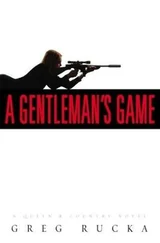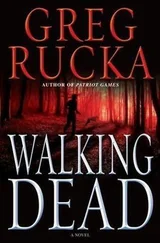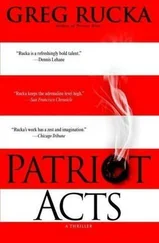Greg Rucka - Critical Space
Здесь есть возможность читать онлайн «Greg Rucka - Critical Space» весь текст электронной книги совершенно бесплатно (целиком полную версию без сокращений). В некоторых случаях можно слушать аудио, скачать через торрент в формате fb2 и присутствует краткое содержание. Жанр: Триллер, на английском языке. Описание произведения, (предисловие) а так же отзывы посетителей доступны на портале библиотеки ЛибКат.
- Название:Critical Space
- Автор:
- Жанр:
- Год:неизвестен
- ISBN:нет данных
- Рейтинг книги:4 / 5. Голосов: 1
-
Избранное:Добавить в избранное
- Отзывы:
-
Ваша оценка:
- 80
- 1
- 2
- 3
- 4
- 5
Critical Space: краткое содержание, описание и аннотация
Предлагаем к чтению аннотацию, описание, краткое содержание или предисловие (зависит от того, что написал сам автор книги «Critical Space»). Если вы не нашли необходимую информацию о книге — напишите в комментариях, мы постараемся отыскать её.
Critical Space — читать онлайн бесплатно полную книгу (весь текст) целиком
Ниже представлен текст книги, разбитый по страницам. Система сохранения места последней прочитанной страницы, позволяет с удобством читать онлайн бесплатно книгу «Critical Space», без необходимости каждый раз заново искать на чём Вы остановились. Поставьте закладку, и сможете в любой момент перейти на страницу, на которой закончили чтение.
Интервал:
Закладка:
You don't supplement vitamin C or potassium simply because you're getting all you need from your fruit intake. If you're female, you supplement iron; if you're male, you take zinc.
You avoid artificial chemicals, and you never take steroids or other engineered drugs. You cannot risk a dependence. Addiction will dull you, teach your body how to lie, and that cannot be permitted.
You go downstairs, to the basement and the mirror.
You begin at the barre bolted to the wall. First position through fifth, standing straight, then in demi-plie, then grand-plie. You do port de bras, a whole series of battements, extending and returning your arms and legs. After a time, you move onto the floor, watching yourself in the mirror, and you repeat the exercises, faster now, and assembling steps into what could charitably be called a dance. A grand temps lie, arabesques from different positions and angles, then the turns.
These lessons in ballet, this practice, is as vital as any exercise with weights or guns, and thus you give it your total concentration and effort. Ballet develops a sense of rhythm and timing; it focuses breathing; it requires control. In ballet, every aspect of the body in motion is the body in control. Each inch of your body is trained to respond precisely to your will, with strength and speed. These are skills that serve you well.
It's an easy transition to go from ajete en tournant on the floor into the padded post, turning your dance into an attack, working on your hand-to-hand skills and your footwork. This is shadow-boxing, fighting invisible enemies at full speed, with all of your power. You're not practicing any specific martial art, you've no interest in Kung Fu katas. What you use is a combat style, uniquely your own, a hodgepodge of maneuvers and moves acquired over the years or developed on your own, picked for speed, savagery, finesse, efficiency.
You work freestyle, stringing moves together and often surprising yourself with new combinations, new ways to move from wrist to elbow to knee. You prefer the post to the heavy bag because you can move around the post, attacking from any angle, any direction, any height. You weave and duck across the floor, defending yourself against invisible assailants, then attacking again, holding nothing back.
If it weren't so damn exhausting, it might be fun.
When you're soaked with perspiration and your lungs are crackling with each breath, you redouble and push harder, because you've never yet been in a fight that ended merely because you wanted a breather.
Often you practice with weapons, using a stick or a knife or both on the pole. Sometimes you wield a set of keys, or a box of wooden matches, or a plastic comb, or a drinking glass, or your shoe, or belt, or watch. You use anything you can think of, anything that might, one day, be at hand. All that matters is where it connects and how hard it hits when it does.
You stop. You're out of breath, sore, thirsty as hell.
Dehydration is a killer.
It may work for those models in magazines, the ones whose muscles are so cut, who look sculpted from clay, but you know the truth behind it. You're actually stronger, in better form and shape and condition than any of those hard bodies, and if you went without water for three days before a photo shoot, your skin would be as thin as paper and your abs would look like that, too.
But of course, then you'd be weak, sick, and dying.
So you damn well stay hydrated.
There's a roll of tape on the end of the barre, and you use it on your wrists before moving to the heavy bag, the one you filled with water, rather than sand, because water makes the bag feel more like a human being would feel. You throw punches, knees, elbows. You practice kicks, always low, because anything higher is too slow and renders you too vulnerable. You practice eye gouges and throat shots and organ hits, always visualizing the anatomy of your target, the solar plexus, the liver, the kidneys, even the frail projection of the xiphoid process, where one blow can send slivers of bone into the vital organs.
You don't ever go for the face unless you want to send a message.
Then to the speed bag, practicing tempo, rhythm, endurance. Then you jump rope, practicing your footwork, staying light and quick.
When you finish, you've been at this for over three hours.
You drink more water, and remind yourself that this was the easy part.
You swim two miles in about forty-five minutes, and with the tide and the waves and the current, you're working out your whole body. The salt water keeps your skin healthy and strong, and you've noticed that cuts and scrapes heal faster as a result of your relationship with the ocean.
Back on shore you stretch, drink water, then you pick up the two-by-four and start your run, holding it in front of you, always in an overhand grip, because carrying it on your shoulders or your back would be too easy. One day you'll have to run carrying something, maybe a rifle, maybe something more awkward and heavy. You begin along the beach, but there are paths all around the house, and you vary your route every day, never allowing your body to become too familiar with any one routine.
At different points along your run, you stop. You grab a branch and do pull-ups or dips. You drop on your back and do sit-ups. Each exercise you do has been picked for its practicality, was long ago evaluated and added to the repertoire on the basis of, first and foremost, how well it trained you to move your own weight, and to move it quickly. You don't do crunches, for instance, because you're not interested in having a washboard upper abdomen; you do sit-ups simply to get to your feet as swiftly as possible, to allow you to perform a kippup, where you can go from flat on your back to your feet with one motion. You do pull-ups because you know one day you will need to lift yourself into cover, or over an obstacle.
You don't do push-ups because you see no possible offensive or defensive use for that motion.
Because you've done these exercises so much, done them so often, your body adapts quickly. That's too close to complacency for you, and so you've got to break it up, vary the routine. Instead of a two-mile swim, you push yourself sometimes to five, swimming the circumference of the lagoon and all the way out to the open sea.
Once a week, you run the equivalent of a marathon, all the way around the island. It's not a very big island, and you can end up running its length multiple times.
Three days a week you train with free weights, but you only work the major muscle groups, and this is to keep your body active in different ways. You're not looking to develop more muscle, only to stimulate what you've already got. Squats and squat thrusts and leg presses to keep the lower body active. Military and bench presses for the upper body and shoulders.
Two days a week you take off to let your body recover. This means you do yoga in the morning, and then a light swim, only a mile. You alternate the days, to keep your body fresh, but you never skip two in a row.
Twice a week, unless there is a need to do otherwise, you work with the firearms. Wearing eye and ear protection in the basement, you fire two hundred rounds through different pistols, different calibers, just keeping in practice. You work with your off hand, you train standing, kneeling, prone, even on your back. You use the shotgun and the submachine gun and the rifle, just to maintain familiarity. Then you clean all the weapons, making certain they work as they were designed to, that they will be ready when you call upon them.
You pick your food carefully. Lean meat, fish, lots of fruit, lots of vegetables. You are partial to watermelon, not only because it has such a high water content, but also because it is an exceptionally nutritious fruit. You drink water constantly, juice occasionally, green tea rarely.
Читать дальшеИнтервал:
Закладка:
Похожие книги на «Critical Space»
Представляем Вашему вниманию похожие книги на «Critical Space» списком для выбора. Мы отобрали схожую по названию и смыслу литературу в надежде предоставить читателям больше вариантов отыскать новые, интересные, ещё непрочитанные произведения.
Обсуждение, отзывы о книге «Critical Space» и просто собственные мнения читателей. Оставьте ваши комментарии, напишите, что Вы думаете о произведении, его смысле или главных героях. Укажите что конкретно понравилось, а что нет, и почему Вы так считаете.











